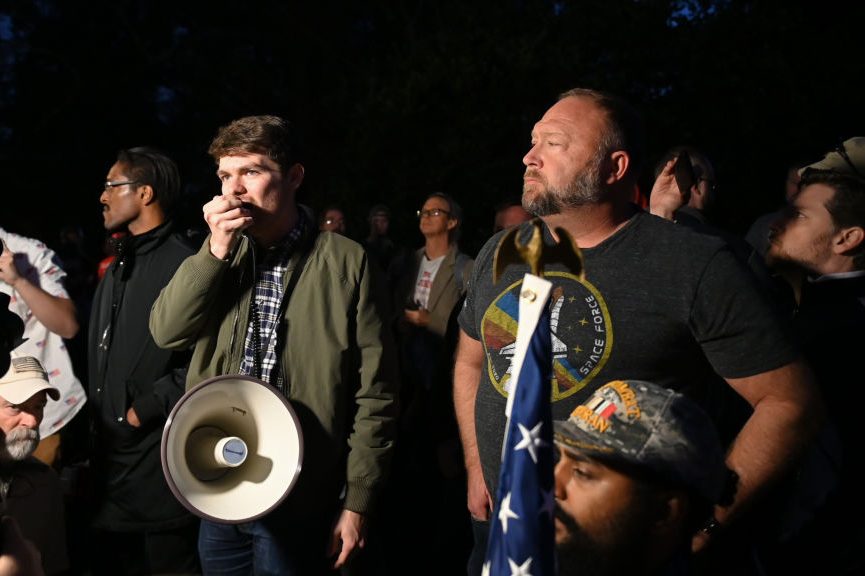The girlboss is dead. Intersectionality killed her. Female CEOs who sacrificed their twenties to build their women-focused businesses are being run out of the industry in droves over accusations that they haven’t been inclusive enough to staff and customers.
The progressives who believe ‘my feminism will be intersectional or it will be bullshit’ have decided that the clothing brands and publishing companies built by and created for women no longer meet the standards of political correctnesss. Put in terms a normal human can understand, these companies are simply too white. It is a valuable lesson for those that try and cater to the demands of the far-left: no matter how feminist you are, it will never be enough and eventually the mob will come for you.
Leandra Cohen, the founder of Man Repeller, stepped away from the site because of criticism about the company’s response to Black Lives Matter. To be clear, the company posted many messages supporting BLM, but that wasn’t enough because, according to one commenter, the website only caters to ‘skinny white rich cis women’. Audrey Gelman resigned as CEO of The Wing, a co-working space for upper-class women, because of claims there was ‘systemic’ racism within the company. Refinery29 and Who What Wear met the same allegations of hypocrisy, with black employees arguing that the companies’ outward messaging about BLM did not match the internal culture. Rumors that Anna Wintour is leaving Conde Nast may be premature, but she’s long been canceled by internet warriors for being the caricature of the shrewd girlboss that treats her employees like dirt.
I’m not sure what these employees expected when going to work for these companies that are created by and clearly intended for upper-class white women. It would be like me going to work for Goop and then complaining that I can’t afford the $1,049 gemstone heat therapy mat. A more productive response to feeling excluded is to join a different group or create your own — aka work and shop somewhere else. It is perfectly acceptable for a business-owner to decide they want to market their product to a certain group of customers. As an editor who has worked at several women’s sites explained to The Spectator, employees and consumers are setting their expectations too high if they think brands exist to solely embody their own version of left-wing politics.
‘Why are people online expecting so much of brands and institutions? I don’t know when these guys are going to realize that…none of these sites or brands or people are your friends,’ the editor said.
Of course, the foot-stomping, tantrum-throwing, demand-listing outcry directed at a brand that fails to cater to your every whim serves only to alienate people who might have been sympathetic to your cause. Meanwhile, the girlbosses are laughing all the way to the bank. They’ve built their kingdoms and made their money, and now they’re slipping out the back door while someone else cleans up the mess.
‘No one is stepping down to “make room for black bodies” or whatever. They’re all rich and famous at this point, so they’re just getting out while they’re ahead and reaping the benefits of an Instagram mea culpa,’ the women’s editor asserted.
The girlboss was never a sustainable concept anyway. The Devil Wears Prada is meant to be a cautionary tale about becoming so obsessed with corporate ladder-climbing that you lose yourself in the process. The main character, Andy, who is desperate to succeed at a fashion magazine, slowly turns into the backstabbing, gossipy woman she used to despise. At the end of the film (spoiler alert!), Andy realizes she has abandoned her personal values, quits her job at the magazine, and reconciles with the boyfriend she drove away.
[special_offer]
In the years since the film’s release, feminist writers have decided that the true villain of The Devil Wears Prada is Andy’s boyfriend, Nate. Nate, they reason, was unfairly stifling Andy’s ambition.
This ‘do anything to get ahead’ attitude was popularized in the late 2010s as a way third-wave feminists taught women to topple the patriarchy. If they acted more like men in business — blunt, ambitious, unfeeling, singularly focused — women would likely be leading more board rooms across the country. Along with the ‘lean in’ methodology came the girlboss, the self-made woman who never took ‘no’ for an answer and made her way to the top of the corporate ladder in the process.
While the few women that were able to create successful companies made out well under this model, millions more young women were left behind slaving away in corporate America. The problem is especially bad for women in media: they’re depressed, perhaps struggling with acute substance abuse, their social lives are dwindling as they spend more time online, and they probably haven’t found the time to start a family. The natural result of women putting off the things that make them happy is to lash out at the companies that they falsely believe should be meeting their psychological needs. The death of the girlboss is hopefully a good reminder that women deserve better than chasing after a very narrow version of success.

























